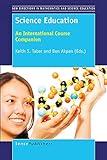Science Education [electronic resource] : An International Course Companion / edited by Keith S. Taber, Ben Akpan.
Material type: TextSeries: New Directions in Mathematics and Science EducationPublisher: Rotterdam : SensePublishers : Imprint: SensePublishers, 2017Description: X, 606 p. online resourceContent type: text Media type: computer Carrier type: online resourceISBN: 9789463007498Subject(s): Education | Education | Education, generalDDC classification: 370 LOC classification: L1-991Online resources: e-book Full-text access
TextSeries: New Directions in Mathematics and Science EducationPublisher: Rotterdam : SensePublishers : Imprint: SensePublishers, 2017Description: X, 606 p. online resourceContent type: text Media type: computer Carrier type: online resourceISBN: 9789463007498Subject(s): Education | Education | Education, generalDDC classification: 370 LOC classification: L1-991Online resources: e-book Full-text access | Item type | Current library | Collection | Call number | Copy number | Status | Notes | Date due | Barcode |
|---|---|---|---|---|---|---|---|---|
| E-Books | MEF eKitap Kütüphanesi | Springer Nature | L1 -991 (Browse shelf (Opens below)) | Available | NATURE | 1419665-1001 |
Preface -- Introduction -- Science Education as a Field of Scholarship.-Section I: Nature of Science and Science Education -- Reflecting the Nature of Science in Science Education -- History and Nature of Science in Science Education -- Beliefs and Science Education -- Epistemic Practices and Scientific Practices in Science Education.-Interdisciplinarity and Science Education -- Section II: Thinking and Learning in Science -- Learning Theories in Science Education.-Scientific Reasoning During Inquiry: Teaching for Metacognition -- The Nature of Student Conceptions in Science -- Tacit Knowledge in Science Education: The Role of Intuition and Insight in Teaching and Learning Science -- Developing Visual/Spatial Thinking in Science Education.-Language, Discourse, Argumentation, and Science Education -- Section III: The Science Curriculum -- Curriculum Development in Science Education -- Science Curriculum Development Initiatives -- Curriculum Implementation in Science Education -- Curriculum Implications of the Integration of Mathematics into Science -- Integrating Engineering Concepts and Practices into Science Education: Challenges and Opportunities -- Section IV: Science Teaching -- Essential Instructional Practices for Science Teaching -- Inquiry-Based Science Education.-Models and Modelling in Science and Science Education -- Context-Based Teaching and Socio-Scientific Issues -- Assessment in Science Education -- Teaching and Learning Physics -- Teaching and Learning Chemistry -- Teaching and Learning Biology -- Section V: Resources for Science Teaching -- The Role of Laboratory in Science Teaching and Learning -- Emerging Technologies and Science Teaching -- 21st Century Skills and Science Learning Environments -- Minds-On Practical Work for Effective Science Learning -- Section VI: Informal Science Education -- Educational Visits and Science Education -- Learning Science in Informal Contexts -- Public Understanding of Science -- Section VII: Inclusive Science Education -- Equity in Science Education -- Science Education and Indigenous Learners -- Science Education for Gifted Learners -- Science Education for Sustainable Development -- Section VIII: Science Teacher Education -- Pedagogical Content Knowledge -- Teacher Preparation for Science Education -- Research Perspectives and Skills for Science Education -- Further Professional Development of Teachers -- National and International Linkages for Science Education through Science Teacher Associations -- Contributors -- Index.
"This book comprises a wide range of scholarly essays introducing readers to key topics and issues in science education. Science education has become a well established field in its own right, with a vast literature, and many active areas of scholarship. Science Education: An International Course Companion offers an entry point for students seeking a sound but introductory understanding of the key perspectives and areas of thinking in science education. Each account is self-contained and offers a scholarly and research-informed introduction to a particular topic, theme, or perspective, with both citations to key literature and recommendations for more advanced reading. Science Education: An International Course Companion allows readers (such as those preparing for school science teaching, or seeking more advanced specialist qualifications) to obtain a broad familiarity with key issues across the field as well as guiding wider reading about particular topics of interest. The book therefore acts as a reader to support learning across courses in science education internationally. The broad coverage of topics is such that that the book will support students following a diverse range of courses and qualifications. The comprehensive nature of the book will allow course leaders and departments to nominate the book as the key reader to support students - their core 'course companion' in science education.".
5
